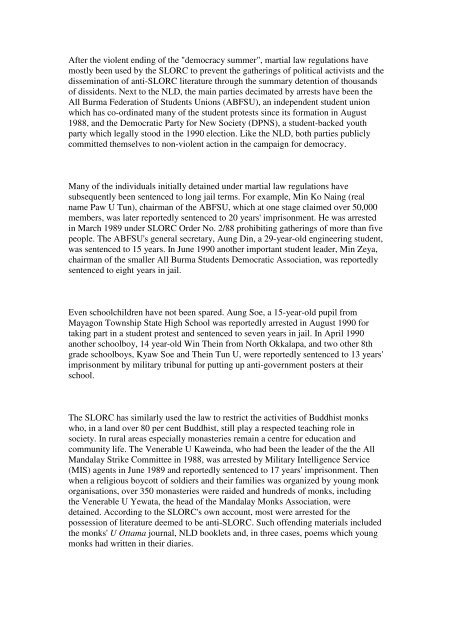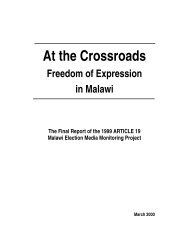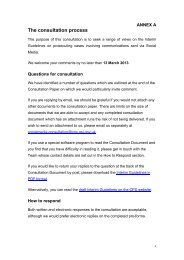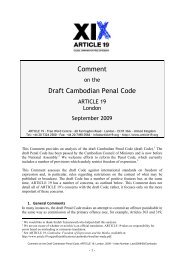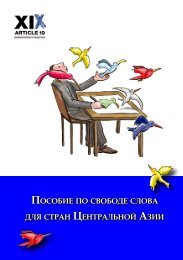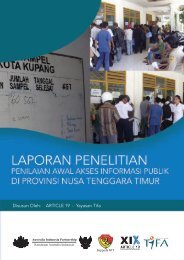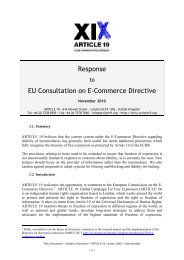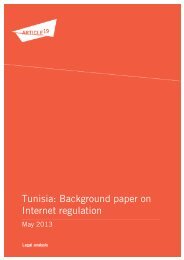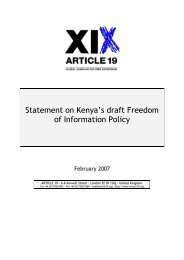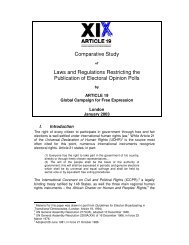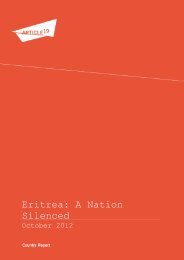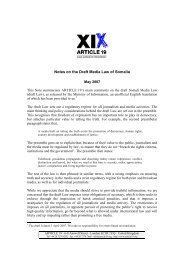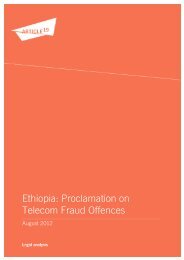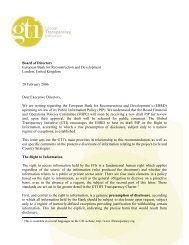"OUR HEADS ARE BLOODY BUT UNBOWED ... - Article 19
"OUR HEADS ARE BLOODY BUT UNBOWED ... - Article 19
"OUR HEADS ARE BLOODY BUT UNBOWED ... - Article 19
Create successful ePaper yourself
Turn your PDF publications into a flip-book with our unique Google optimized e-Paper software.
After the violent ending of the "democracy summer", martial law regulations havemostly been used by the SLORC to prevent the gatherings of political activists and thedissemination of anti-SLORC literature through the summary detention of thousandsof dissidents. Next to the NLD, the main parties decimated by arrests have been theAll Burma Federation of Students Unions (ABFSU), an independent student unionwhich has co-ordinated many of the student protests since its formation in August<strong>19</strong>88, and the Democratic Party for New Society (DPNS), a student-backed youthparty which legally stood in the <strong>19</strong>90 election. Like the NLD, both parties publiclycommitted themselves to non-violent action in the campaign for democracy.Many of the individuals initially detained under martial law regulations havesubsequently been sentenced to long jail terms. For example, Min Ko Naing (realname Paw U Tun), chairman of the ABFSU, which at one stage claimed over 50,000members, was later reportedly sentenced to 20 years' imprisonment. He was arrestedin March <strong>19</strong>89 under SLORC Order No. 2/88 prohibiting gatherings of more than fivepeople. The ABFSU's general secretary, Aung Din, a 29-year-old engineering student,was sentenced to 15 years. In June <strong>19</strong>90 another important student leader, Min Zeya,chairman of the smaller All Burma Students Democratic Association, was reportedlysentenced to eight years in jail.Even schoolchildren have not been spared. Aung Soe, a 15-year-old pupil fromMayagon Township State High School was reportedly arrested in August <strong>19</strong>90 fortaking part in a student protest and sentenced to seven years in jail. In April <strong>19</strong>90another schoolboy, 14 year-old Win Thein from North Okkalapa, and two other 8thgrade schoolboys, Kyaw Soe and Thein Tun U, were reportedly sentenced to 13 years'imprisonment by military tribunal for putting up anti-government posters at theirschool.The SLORC has similarly used the law to restrict the activities of Buddhist monkswho, in a land over 80 per cent Buddhist, still play a respected teaching role insociety. In rural areas especially monasteries remain a centre for education andcommunity life. The Venerable U Kaweinda, who had been the leader of the the AllMandalay Strike Committee in <strong>19</strong>88, was arrested by Military Intelligence Service(MIS) agents in June <strong>19</strong>89 and reportedly sentenced to 17 years' imprisonment. Thenwhen a religious boycott of soldiers and their families was organized by young monkorganisations, over 350 monasteries were raided and hundreds of monks, includingthe Venerable U Yewata, the head of the Mandalay Monks Association, weredetained. According to the SLORC's own account, most were arrested for thepossession of literature deemed to be anti-SLORC. Such offending materials includedthe monks' U Ottama journal, NLD booklets and, in three cases, poems which youngmonks had written in their diaries.


